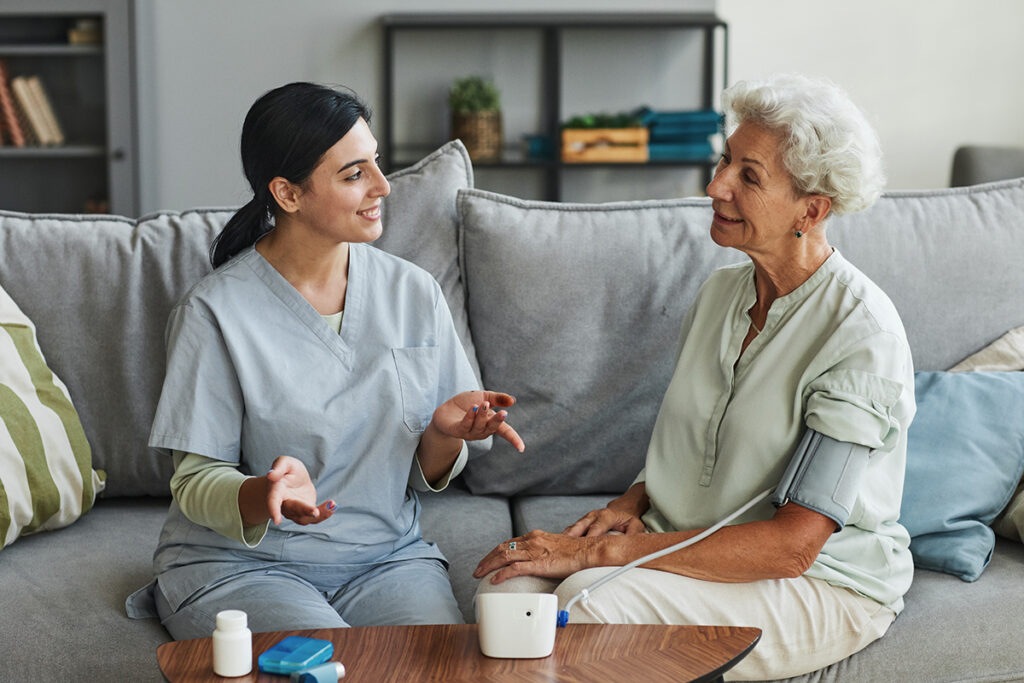When your parent needs more support, choosing the right level of care can feel overwhelming. Two standard options, assisted living and skilled nursing, offer different types of care, environments, and costs. Understanding the differences between these options is crucial to making the best decision for your loved one.
Understanding assisted living
Assisted living is designed for people who are generally independent but need help with daily activities such as bathing, dressing, or managing medications. These communities provide a residential setting that encourages autonomy while offering support when needed.
Residents typically live in private or semi-private apartments and can access communal dining, social activities, and transportation services. The focus is on maintaining a high quality of life with personalized care plans tailored to individual needs.
What is skilled nursing?
Skilled nursing facilities (SNFs), often called nursing homes, provide 24-hour medical care for those with severe health conditions or who are recovering from surgery or illness. These facilities are staffed by licensed nurses and other healthcare professionals who offer wound care, physical therapy, and intravenous therapy.
Skilled nursing is appropriate for anyone who requires ongoing medical attention and cannot be safely cared for at home or in an assisted living setting. The environment is more clinical, focusing on medical care and rehabilitation.
Assisted living vs. skilled nursing: key differences
|
Aspect |
Assisted Living |
Skilled Nursing |
|---|---|---|
|
Level of Care |
Help with daily activities |
24/7 medical care and monitoring |
|
Staffing |
Caregivers and limited nursing staff |
Licensed nurses and healthcare professionals |
|
Living Space |
Private or semi-private apartments |
Hospital-like rooms with medical equipment |
|
Services |
Meals, housekeeping, social activities |
Medical treatments, rehabilitation services |
|
Ideal For |
Anyone needing minimal assistance |
People with severe health conditions |
Cost considerations
The cost of care varies significantly between assisted living and skilled nursing facilities. Assisted living is generally less expensive, as it provides non-medical support. Skilled nursing facilities that offer comprehensive medical care tend to be more costly.
Payment options also differ. Assisted living is often paid out-of-pocket, though some long-term care insurance policies may cover specific services. Medicare may cover skilled nursing care for a limited time following a hospital stay, and Medicaid may assist with costs for eligible residents.
Daily life in each setting
In assisted living communities, residents enjoy a more home-like environment with opportunities for social engagement, recreational activities, and greater independence. The atmosphere is designed to be welcoming and supportive, promoting a sense of community.
Conversely, skilled nursing facilities focus on medical care and rehabilitation. The daily routine is more structured, with scheduled treatments and therapies. Social activities may be available, but are often limited due to residents’ health conditions.
When to consider skilled nursing over assisted living
Skilled nursing is appropriate when your parent:
- Requires constant medical supervision
- Is recovering from surgery or a serious illness
- Has complex medical needs that cannot be managed in an assisted living setting
- Needs specialized therapies, such as physical or occupational therapy
Assisted living may be better if your parent is relatively independent but needs help with daily tasks. Assessing their health status and consulting with healthcare professionals to determine the most suitable option is essential.
Frequently asked questions
What’s the difference between skilled nursing and assisted living?
Assisted living provides support with daily activities in a residential setting, which is ideal for people who are mostly independent. Skilled nursing offers 24-hour medical care for those with severe health conditions or recovering from surgery.
Which is more expensive: a nursing home or assisted living?
Generally, skilled nursing facilities (nursing homes) are more expensive due to the comprehensive medical care provided. Assisted living is typically less costly and focuses on non-medical support.
Who is not a good candidate for assisted living?
Individuals who require constant medical supervision, have complex health conditions, or need specialized therapies are better suited for skilled nursing facilities rather than assisted living.
Choosing the right care with The Arbors and The Ivy
At The Arbors and The Ivy, we understand that every individual has unique needs. Our assisted living communities are designed to provide personalized support, promoting independence and enhancing quality of life. We offer a range of services and amenities tailored to meet the diverse needs of our residents.
If you’re uncertain about the best care option for your parent, our experienced team is here to help. We can guide you through the decision-making process, ensuring that your loved one receives the appropriate level of care in a compassionate and supportive environment.
Contact The Arbors or The Ivy today at 860.698.8613 or online to learn more about our communities and how we can help you make the best choice for your family’s needs.

